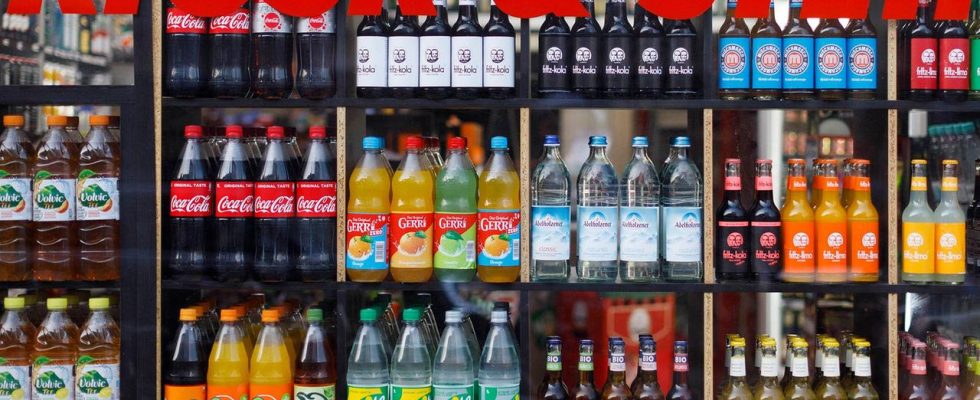According to a study, a sugar tax on soft drinks would save up to 16 billion euros in health costs in Germany over the next two decades. Many illnesses could be avoided.
A sugar tax on soft drinks would save up to 16 billion euros in Germany over the next two decades alone and prevent numerous illnesses. This is the result of a study by the Technical University of Munich and the British University of Liverpool in the specialist magazine “PLOS Medicine”.
“A soft drinks tax in Germany would have significant positive effects,” concludes the research team. In all simulated variants, less sugar would be consumed and illnesses would be less common. “In this way, economic costs could be reduced and the burden on the health system could be relieved.”
Risk of being overweight decreases
The World Health Organization recommends a special tax of at least 20 percent on sugary drinks in order to reduce the population’s sugar consumption and its health consequences. Many countries have already introduced tax measures to combat the consumption of sugary drinks or foods. Instead, Germany is relying on a voluntary commitment from the beverage industry – according to studies so far with moderate results.
The study from Munich now shows that the desired effect of a tax would actually occur in this country and that the risk of obesity and illness would decrease. “A soda tax works,” said a reaction from the consumer organization Foodwatch. This has been shown by the experience from Great Britain, where manufacturers have drastically reduced the sugar content in their drinks and the consumption of lemonade has fallen.
Demand for soft drinks would decrease
Sugary drinks are considered to be a key driver of obesity and associated diseases such as type 2 diabetes and cardiovascular diseases, and the suffering of those affected and the subsequent costs are great. This has been known for a long time, but the government is doing nothing to stop the fact that sugary drinks are making young people sick, Foodwatch criticized.
The current study looks at taxation scenarios that aim either to generally reduce soft drink consumption or to bring about recipe changes. According to international studies, if the tax is due regardless of the sugar content, this will primarily lead to a reduced demand for soft drinks. However, if the tax is based on the amount of sugar, the recipes of the drinks would also be changed.
Great effects on type 2 diabetes
“According to the simulation, with a flat 20 percent surcharge on soft drink prices, sugar consumption per day and person would decrease by one gram,” the researchers described the potential effects in Germany. According to estimates, in the group of men between 30 and 49 years old it would be just under three grams per day.
“An even greater impact would be a 30 percent reduction in sugar in recipes, as was recorded in Great Britain after the introduction of the graduated manufacturer levy,” explained the team of experts. This would reduce per capita consumption in Germany by 2.3 grams per day, and by as much as 6.1 grams for 30 to 49-year-old men.
According to the team’s calculations, with both taxation options there would be significantly fewer cases of obesity and cardiovascular diseases. The expected effects are particularly large for type 2 diabetes: “According to our models, up to 244,100 people would develop type 2 diabetes later or not at all within the next 20 years,” explained the first author of the study, Karl Emmert -Fees.
16 billion would be saved
With a tax on sweetened drinks, fewer treatments would be necessary and the costs of sick days and incapacity to work would also fall. For the period 2023 to 2043, the team calculated economic savings of around 16 billion euros with a staggered manufacturer levy, including around four billion euros in healthcare costs. “With a 20 percent tax it would still be around 9.5 billion euros in total.”
In addition, people under the age of 30 were not taken into account in the calculations because most of the modeled diseases occur primarily in the second half of life. However, soft drink consumption is highest among teenagers, explained Emmert-Fees. “Accordingly, the average reduction in sugar consumption would be even more drastic and the positive health effect even greater if we took younger people into account.”
Advertising bans are also being discussed
“The introduction of a sugar tax is effective and is recommended for German politics,” explained Michael Stolpe from the Institute for the World Economy (IfW) in Kiel about the current results. “Advertising bans, such as those introduced for cigarettes, could also help reduce sugar consumption.” In addition, increased education among children and young people would make sense, said the head of the Global Health Economics project area, who was not himself involved in the study. “Young people, particularly young men, consume sugary drinks to a much greater extent than older people.” Their long-term health therefore benefited most from measures to reduce sugar consumption.
Falk Schwendicke from the Charité in Berlin also believes that taxing sugar-sweetened drinks makes a lot of sense from a health policy and economic perspective. “The calculated cost savings and health gains are significant.” Population groups that are otherwise not easy to reach could have their behavior positively influenced.

